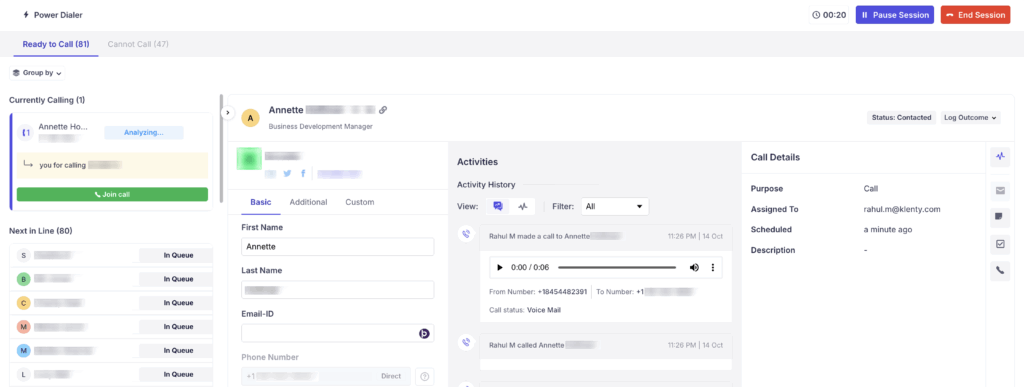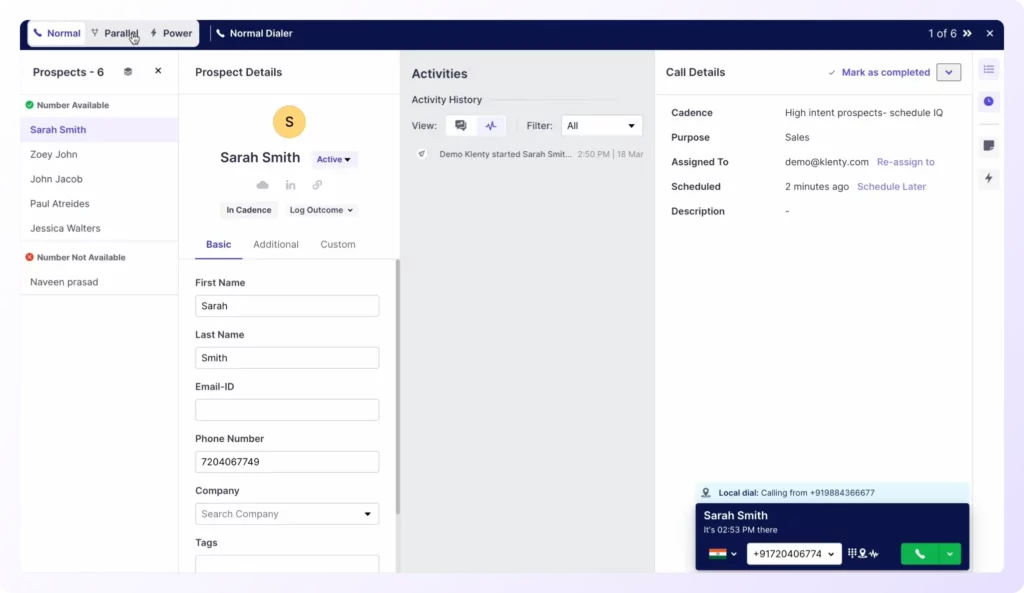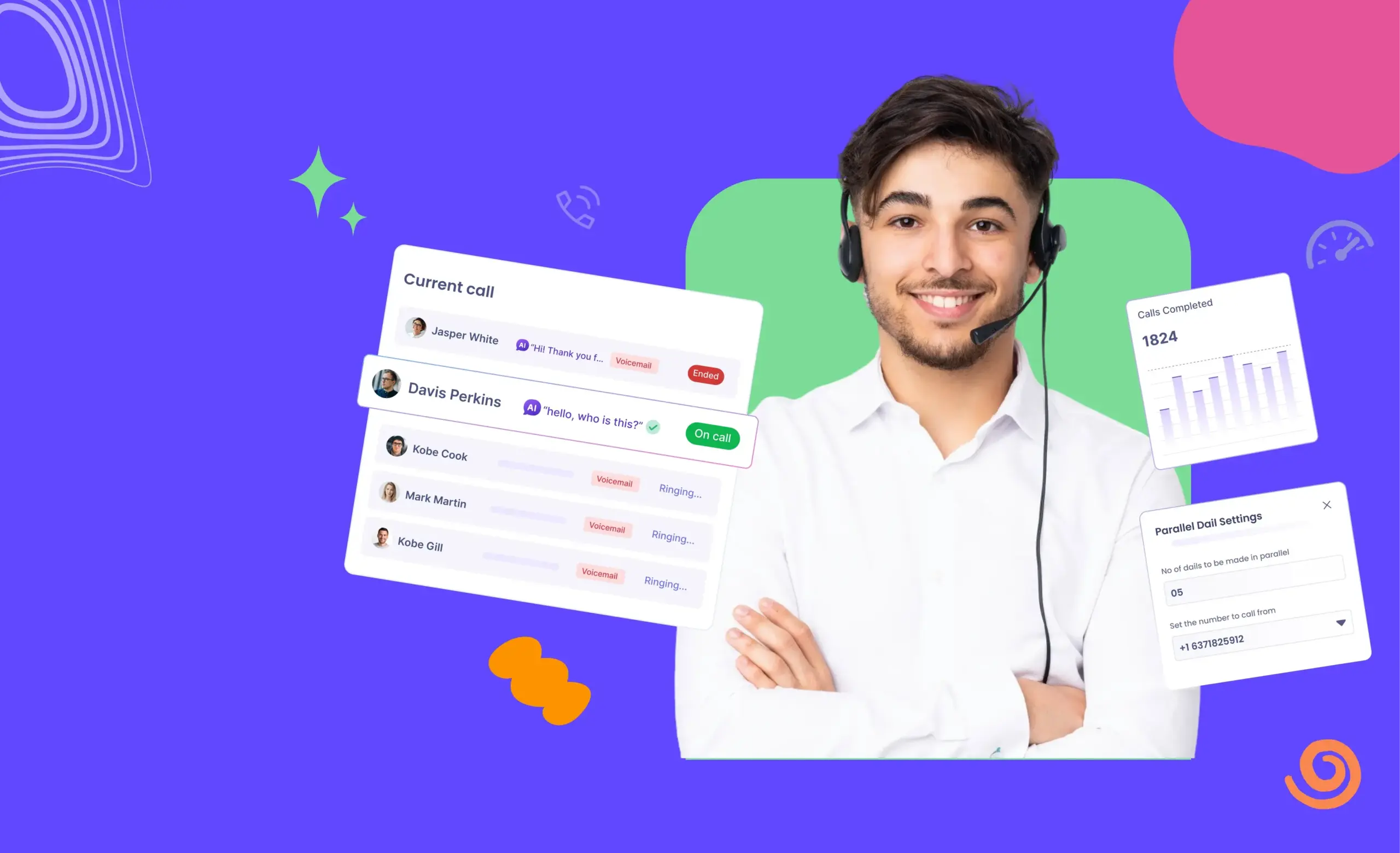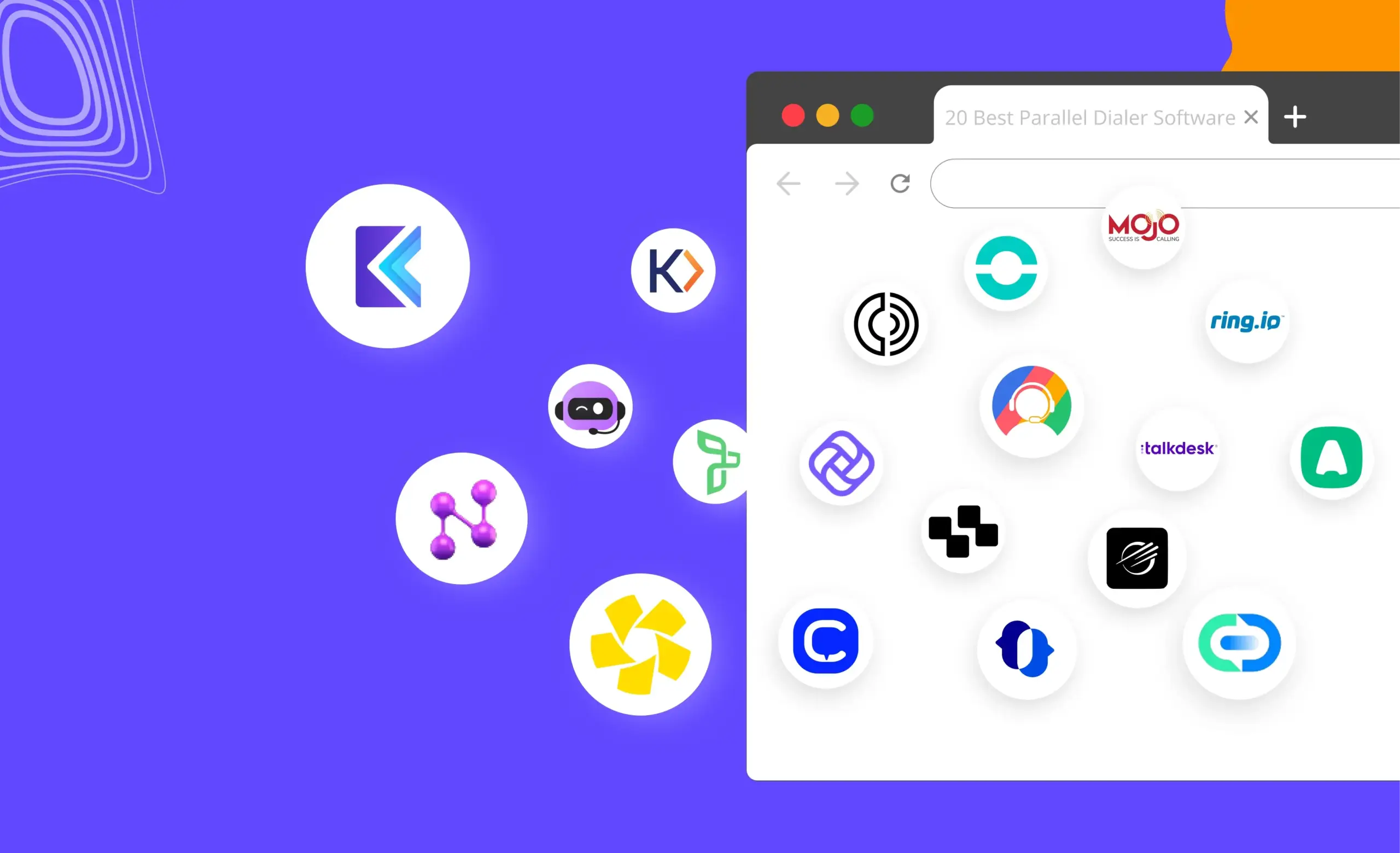Cold calling is the hardest job in sales. You're left enriching phone numbers manually across multiple providers, dialing numbers one by one, listening to endless voicemail greetings, and navigating confusing IVRs. You watch valuable hours disappear on non-pipeline activity: placing manual dials, admin work like updating CRM records after each call, listening to recordings, reading transcripts, and leaving voicemails manually.
Here are the four major problems you face:
- Dialing each number manually means endless phone trees, unanswered calls, and lost time just waiting for connections.
- Admin swallows your day, updating CRM outcomes, listening to call recordings, reading transcripts, and leaving voicemails one by one.
- Without a winning talk track, reps wing their calls, missing the chance to deliver consistent messaging or handle objections smoothly.
- You're stuck sourcing and enriching phone numbers from multiple providers, often with poor data quality and a never-ending data clean-up.
But you don't need to keep spinning your wheels. Outbound dialers remove these manual and time-consuming aspects, automating dialing, voicemail drop, CRM updating, and talk track management, so you can focus on real prospect conversations that move your pipeline forward.
Let's dig into what an outbound dialer is, how it works, and how you can unlock more meetings booked on the phone.
What Is an Outbound Dialer?
An outbound dialer is a software platform that helps SDRs automate the process of outbound calling.
Outbound dialers eliminate the manual processes involved in cold calling, from dialing individual numbers to logging call details into your CRM. This saves you time and effort, allowing you to focus more on engaging prospects than manually dialing numbers.
What are the Types of Outbound Dialers, and When Should You Use Each?
Choosing the right Outbound dialer isn't just about speed; it's about how well your tool fits your workflow, scales with your volume, and keeps you focused on genuine pipeline activity.
Here's what you need to know about each major dialer category before you decide.
1. Multimode Sales Dialer
Multimode dialers deliver true flexibility, letting you switch calling strategies instantly depending on your outreach goals. You can move from a high-speed power session to a focused, personalized pitch, all without leaving your main workflow.
AI Power Dialer
The AI Power Dialer automatically dials a list of prospects, one after another, with zero manual input required after you start the session. You set the pace, and as soon as a call ends (or goes to voicemail), the next number is dialed.

Features:
- Start a whole session with one click, no reloading, no list fumbling.
- Save 2–3 hours per week on dialing alone by eliminating manual number entry.
- Drop pre-recorded voicemails without waiting for the beep.
- Local presence dialing uses area codes your prospects recognize, boosting pickup rates.
- Every call is logged and transcribed automatically to your CRM for best-in-class reporting and analysis.
- After calling, you see detailed breakdowns of your total dials, connects, talk time, and meetings booked
AI Parallel Dialer
The AI Parallel Dialer lets you call multiple prospects at once (for example, up to five prospects simultaneously). This is a game-changer for high-volume outbound or when connect rates are low.

Features:
- Dial several numbers at once to maximize your total daily connects, skipping unanswered lines, voicemails, and IVRs automatically.
- Best for high-volume lists where you need to engage a massive TAM
- Reduces idle time to nearly zero; you always get pushed to the next live call, not voicemail.
- Instantly drop voicemails to all missed calls, increasing your touchpoints while you speak with live answers.
Click-to-Call Dialer
With Click-to-Call Dialer, you launch calls directly from within your CRM or sales engagement platform with a single click.

Features:
- All prospect info, past interactions, scripts, and notes are right at your fingertips, ideal for high-quality, targeted outreach.
- Choose your call moment: Review background, tweak your script, and reach out when you're truly ready.
- Great for newer reps or for niche accounts where every conversation deserves preparation.
- Every call is logged and available for analysis and future follow-up, helping you refine your approach over time.
Cons:
As powerful as multimodal dialers are, problems crop up when they're not fully integrated with your sales engagement platform. The moment your dialer stands alone, you're forced back into old admin habits: exporting call data to spreadsheets, manually updating campaign outcomes, and juggling multiple tabs just to track activity.
This disconnect breaks your rhythm, delays follow-ups, and hides account progress from everyone but the caller. Without direct integration, pipeline activity visibility plummets, and your SDRs end up squandering valuable time on manual, non-revenue work, instead of driving real conversations and booking more meetings.
2. Standalone Dialers
Standalone dialers are built around just one dialing method- limited to power, parallel, or click-to-call dialing. You lack the flexibility to adapt your approach to the needs of different prospect lists.
For example, if you start your day cold calling and need volume (AI Power/AI Parallel Dialer), but then want to switch to a personalized follow-up (Click-to-Call), you're forced to log out, open another tool, or change your workflow entirely.
Features:
- Auto-dialing through lists using one set pattern (Power or Predictive).
- Call recording and basic playback for quality assurance.
- Disposition codes after each call to tally results.
- Simple reports on total dials, connects, and average talk time.
- Some support basic voicemail drop or call transfer, but customization is often limited.
Cons:
- Only one dialer mode is offered; you can't dynamically switch between power, parallel, or click-to-call, limiting your ability to tailor outreach for different lead stages.
- The lack of flexibility forces teams to buy and learn multiple tools if they want to cover every scenario, increasing costs and complexity.
- On top of this, these tools often lack engagement automation and CRM sync, meaning your pipeline activity and engagement strategy become fragmented and inefficient.
3. CRM Dialers
CRM Dialers integrate with your CRM and let you call without leaving your system of record.
Every call, note, and follow-up can be attached to timelines, keeping your full activity stream transparent.
Features:
- One-click dialing from contact and opportunity records, with automatic call logging and recording.
- Personalized call scripts or next-best-action popups based on CRM field data.
- Schedule follow-up reminders linked to pipeline stages, preventing prospects from falling through the cracks.
Cons:
- Most CRM dialers limit speed, only replicating click-to-call or manual dialing, no true parallel or predictive dialing.
- Advanced features (AI summaries, call scoring, coaching suggestions) may be missing, and workflow customization options are often limited.
- If your outbound requires high call volume, you may find this too slow or lacking in queue management and workflow automation.
4. Integrated Sales Engagement Platform + Outbound Dialer
If you're running a multi-channel sales process, a full-featured sales engagement software with built-in outbound dialers, multi-channel sequence orchestration, analytics, and Agentic AI might be what you need.
Depth of Integration:
- Let you dial prospects in parallel (Parallel Dialer), sequentially in a click (Power Dialer) or one by one manually (Click-to-Call Dialer) all in one platform
- Moves you between emails, calls, tasks, and social touches without tab-hopping or copy-paste admin.
- AI agents assist with list building, sales cadence creation, research, personalization, call summary analysis, and prospect prioritization for every rep.
- Reps can switch dialing modes mid-campaign, follow up using advanced sequences, and leverage NLU-driven coaching or objection handling.
Pros:
- Full pipeline activity focus: See every prospect's journey and status, automate reminders, and reduce no-shows.
- Single source of metrics for reporting, no more reconciling data from 5 different tools.
- Reduces SaaS sprawl: Lower overall cost and fewer system conflicts or sync errors.
- Every activity is tracked and coached, so SDRs progress faster and ramp sooner.
Klenty is a complete AI-driven Sales Engagement Platform, built to automate every repetitive step so you focus purely on prospect conversations. Klenty's multi-mode sales dialer lets you choose Power, Parallel, or Click-to-Call based on your dialing volume, connect rates, and the level of engagement you want, without ever switching platforms.
You never have to worry about manual CRM data entry, messy exports, or losing context between calls. Klenty deeply integrates with your CRM and centralizes your sales engagement, prospect research, call notes, and analytics under one roof. Every sync happens instantly, so pipeline activity is always visible and up to date
| Dialer Type | What Does It Do for You? | When Should You Use It? |
| AI Power Dialer | Automatically dials your call list, one after another, letting you focus only on talking to prospects, not manual work or wasted seconds. | When you want to reach more prospects in less time, break into new markets, or give yourself maximum pipeline-building time with fewer distractions and higher energy. |
| AI Parallel Dialer | Let's you call up to 5 prospects at once, instantly connecting you to the first person who picks up, so you never stall waiting for live connects. | When your goal is to maximize daily conversations, skip over bad numbers automatically, or attack huge lists so you cover more ground and increase your booked meetings. |
| Click-To-Call Dialer | Gives you complete control, just one click from your CRM, and you're talking, with all prospect info ready to help you personalize every call. | Perfect if you're newer to cold calling, following up after prior interactions, or working on niche lists where every conversation counts and you want to set your own pace. |
Why Should You Use an Outbound Dialer?
The reason is simple: traditional outreach tools saddle you with manual dialing, dial tones, voicemails, IVRs, admin work, and list management.
Outbound dialers let you automate the tedious mechanics and bring every minute back to driving meetings and pipeline activity.
1. Increased Efficiency
With an outbound dialer, you automate dialing, weed out busy signals and voicemails, and connect instantly with live prospects. Dial multiple numbers at once, drop pre-recorded voicemails, and save 2–3 hours per week, so all your time goes to real conversations.
2. Enhanced Prospect Engagement
You can instantly switch between dialing modes based on the type of prospect engagement, blitz through high-volume cold calls with Parallel Dialer, work targeted lists at your own pace with Power Dialer, or use Click-to-Call to deliver warm, personalized outreach with all research and conversation history at your fingertips. This flexibility ensures you're always using the best approach for cold calls, high-volume campaigns, or high-value, personalized conversations, so no important follow-up ever slips through the cracks.
3. Data Insights
Track key metrics: call volume, conversion rates, talk time, and call outcomes. Every call is logged, transcribed, and analyzed automatically, so you get instant feedback and can optimize your outreach, coaching, and campaign alignment.
4. Better Call Coaching
Every outbound call is recorded and automatically transcribed. Managers and reps use these recordings for personalized coaching and deal reviews, building skills and improving results with targeted, data-driven feedback.
This section now uses language and positioning directly from Klenty's official documentation, emphasizing rep productivity, pipeline focus, CRM integration, analytics, and AI automation, all verified from your provided sources.
Why Is Klenty's Outbound Dialer the Right Fit for You?
If you're searching for an outbound dialer that can finally eliminate busywork and help you build a real pipeline, Klenty is designed exactly for you.
Most platforms keep you stuck in manual work, but with Klenty, you give yourself a true outbound advantage, powered by a team of AI agents working on your behalf every step of the way.
Klenty is built to help you focus on pipeline activity by maximizing your dialing velocity, boosting connect rates, reducing admin work with AI, and giving you the coaching tools to make every rep follow a proven talk track.
All of this lets you spend more time in conversations that book meetings and build a pipeline, instead of getting stuck on busywork.
Here's how Klenty delivers pipeline results:
Maximize Dialing Velocity
- Parallel Dialer: Dial up to 5 prospects at once and make 5x more calls in less time.
- Power Dialer: Blitz through your call list automatically, no manual dialing, just pure efficiency.
Maximize Connect Rate
- Instantly switch to local numbers to build trust and increase answer rates.
- Time zone detection batches prospects so you always call during their working hours.
- Drop pre-recorded voicemails with one click to boost callbacks.
- Use multiple "from" numbers to rotate and avoid getting marked as spam.
Reduce Admin Work With AI
- Auto voicemail detection and 1-click voicemail drop save you hours every week.
- Call transcription and AI-powered call summarization mean you never miss a detail.
- Activity and notes auto-sync with your CRM, wiping out manual updates and letting you focus on live calls.
Coach Reps With Intelligence
- Customizable call summaries help you capture the details and insights that matter most for your process.
- Talk Track Tables keep reps on-script and on message, making sure everyone follows your best-performing pitch.
- Goals: Set weekly and monthly call activity targets, and track achievements centrally in the platform.
- Reports: Instantly see call performance at the list, cadence, account, and rep level so you can coach for peak performance.
With Klenty, you stop spending energy on non-pipeline admin and start focusing on conversations and meetings booked, your true pipeline activities.
Ready to experience the shift? Book a demo of Klenty's Outbound dialer and see how true outbound effectiveness feels in action.





